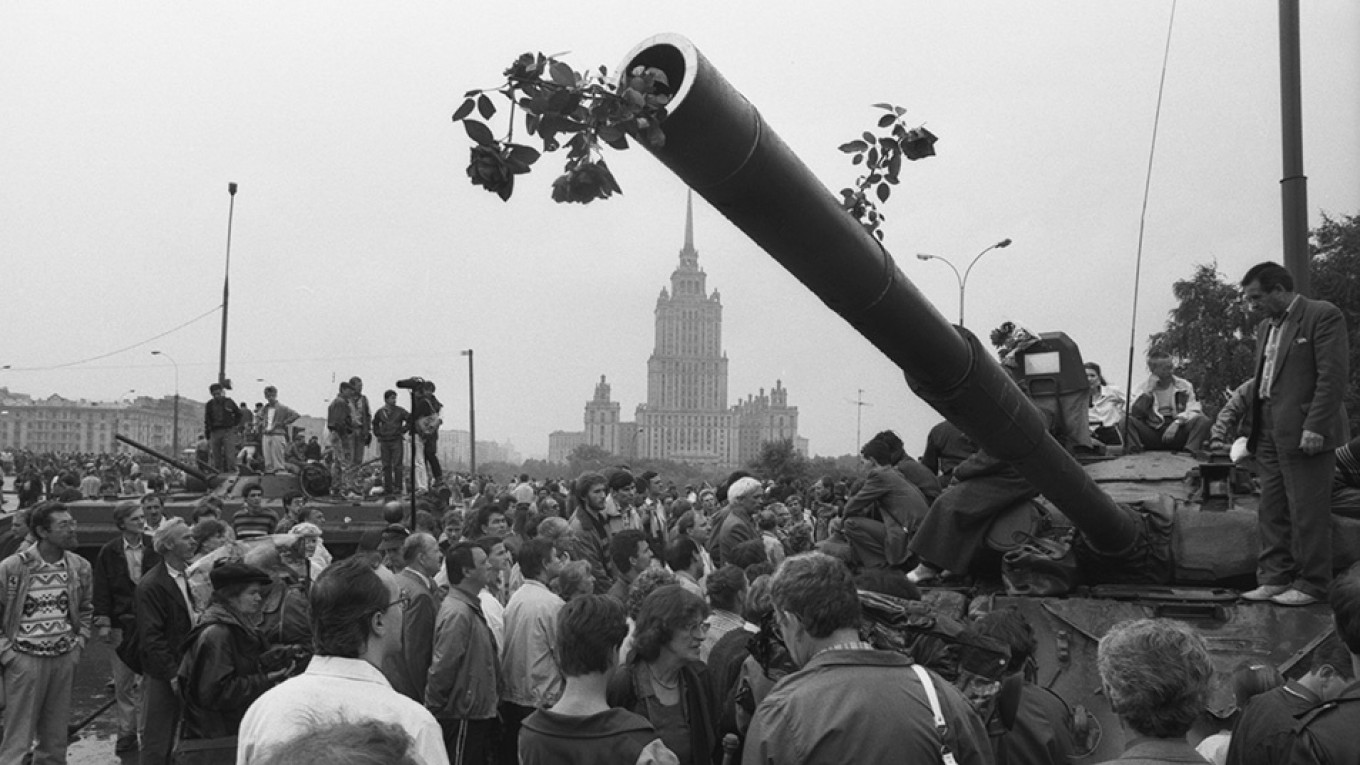*Editor's note: This article was first published on Aug. 19, 2011.
Aug. 19, 1991, is probably one of the few days of my life that I will always remember down to the smallest detail. I was an anchor at “Vesti” news, and at 6 a.m. my editor woke me with a phone call.
“Get up and turn on the television!” he shouted. “A military coup is under way!”
It would be wrong to say this came as a complete surprise. Dark, ominous clouds had been gathering on the political and economic horizon for a long time. As early as mid-1990, it had become clear that the situation in the country was out of control, that reforms had gone much further than the hard-line Communists wanted. At the very most, they were willing to give the Soviet Union a slight face-lift but by no means change the very foundation of the Communist dictatorship.
The “Vesti” news program on Channel 2 (now Rossia One) had offered critical coverage of the authorities since it first hit the airwaves in May 1991. Thus, on the morning of Aug. 19, my colleagues and I did not even think of going to work at the broadcast studio. We were certain that the building had already been seized by special troops and KGB officers. We thought that the government would soon begin detaining pro-democracy politicians and journalists, starting with the country’s liberal television journalists and political commentators. In the initial phase of our panic, we actually considered making a dash for the border while we still had time.
Because I lived just half a block from the studio, almost all the anxious “Vesti” staff were gathered in my apartment by 9 a.m. to discuss our next step. This, of course, was a very different time. Back then, we did not have pagers or mobile phones. Nor was there cable television or the internet transmitting a dozen live 24-hour news sources into our homes. Worse, it was the summer, and many people were at their dachas where there was no telephone service and only patchy television coverage.
The authorities stopped our broadcasts, but we were still able to film everything that was happening in Moscow, improvising as we went. We recorded copies on videotape and sent them by airplane courier to other cities across Russia to be shown on local television stations, provided that journalists and their editors were brave enough to air them. Happily, many did. What’s more, “Vesti’s” technical whizzes figured out a way to sidestep the jamming of our broadcasts and air "illegal" news programs in Eastern Siberia and the Far East.
In all the confusion and chaos during the putsch, one brave journalist at Central Television, the government’s main television network (now Channel One), offered a news broadcast at 3 p.m. on Aug. 20, the second day of the putsch, with a report on everything that the putschists didn’t want the people to know. Significantly, the report mentioned the decrees by Boris Yeltsin declaring the coup illegitimate, unconstitutional and illegal; the flood of condemnations of the coup by world leaders; and the spontaneous protests against the putsch that had broken out in Moscow, St. Petersburg, Kiev and other major cities.
On an ordinary day, this time slot in the middle of the day would have attracted few viewers, but given the complete information blackout imposed by the authorities, it seems that the whole country watched the 3 o’clock news.
Everyone was shocked by the broadcast. Why did Central Television make such an abrupt about-face at the very peak of the tensions?
As it turned out, the young news anchor, taking advantage of the fact that the authorities were not monitoring her activities, acted at her own risk to release a report of everything that the putsch resisters had been doing. And that broadcast sent a resounding signal to millions of Soviet citizens whose futures depended on the outcome of the fierce battle among the elites — that there was a popular revolt against the coup attempt and Yeltsin was leading the effort. This one broadcast had a tremendous snowball effect, whipping up new waves of protesters ready to support Yeltsin’s efforts to defeat the coup.
The television report also had a huge impact on the ruling class, particularly the army and Alpha special forces. Up until this report, the leaders of these divisions were sitting at their bases waiting for final orders to storm the White House. Then, they saw with their own eyes on official government television, which at that time had almost as much weight as the Central Committee of the Communist Party, that the putsch was crumbling like a house of cards. At this point, the loyalty among both the military and political elite swung dramatically toward Yeltsin. The coup was over before it had started.
They saw with their own eyes on official government television that the putsch was crumbling like a house of cards
To be sure, the people played a crucial role in this defeat. We should always honor those who were not afraid to join the struggle in the streets and who stood vigil for three days and two nights at the White House.
But contrary to popular opinion, the ruling elite played an equally important role. Under Yeltsin, then-president of the Russian Republic of the Soviet Union, former Communist Party functionaries became the elected heads of autonomous regions and republics with a virtual carte blanche to seize as much sovereignty as they could handle. Moreover, Russia’s top bureaucrats — ministers, army generals and KGB officers — saw that the choicest assets were theirs for the taking, while others were making good money in the quasi-private market. Under these circumstances, it was no surprise that these officials did not support the putsch. They distanced themselves from the likes of KGB chief Vladimir Kryuchkov, one of the putsch leaders who symbolized the retrograde Communist hard-liners who were determined to hold on to the decrepit, dying Soviet empire at all costs.
Unfortunately, today’s leaders try to offer an air-brushed version of the failed coup attempt, saying that the Kremlin has continued the great democratic tradition of those who repelled the 1991 coup and that the people always have the right to rise up against usurpers, tyrants and dictators.
But this is far from the truth. Judging by the autocratic policies of the current leaders — who by all indications will try to remain in power for at least another decade — they have much more in common with the reactionary putschists than with the brave people who took to the streets to protect democracy and freedom.
Yevgeny Kiselyov is a journalist, best known for being the anchor of the popular news show "Itogi." In 2008, he moved to Ukraine. The views and opinions expressed in opinion pieces do not necessarily reflect the position of The Moscow Times.
A Message from The Moscow Times:
Dear readers,
We are facing unprecedented challenges. Russia's Prosecutor General's Office has designated The Moscow Times as an "undesirable" organization, criminalizing our work and putting our staff at risk of prosecution. This follows our earlier unjust labeling as a "foreign agent."
These actions are direct attempts to silence independent journalism in Russia. The authorities claim our work "discredits the decisions of the Russian leadership." We see things differently: we strive to provide accurate, unbiased reporting on Russia.
We, the journalists of The Moscow Times, refuse to be silenced. But to continue our work, we need your help.
Your support, no matter how small, makes a world of difference. If you can, please support us monthly starting from just $2. It's quick to set up, and every contribution makes a significant impact.
By supporting The Moscow Times, you're defending open, independent journalism in the face of repression. Thank you for standing with us.
Remind me later.







